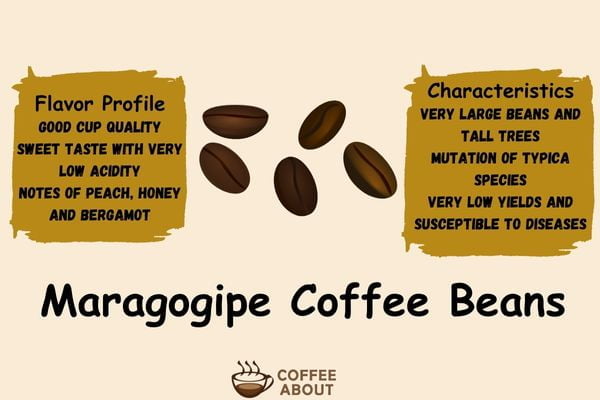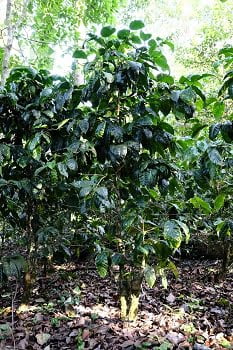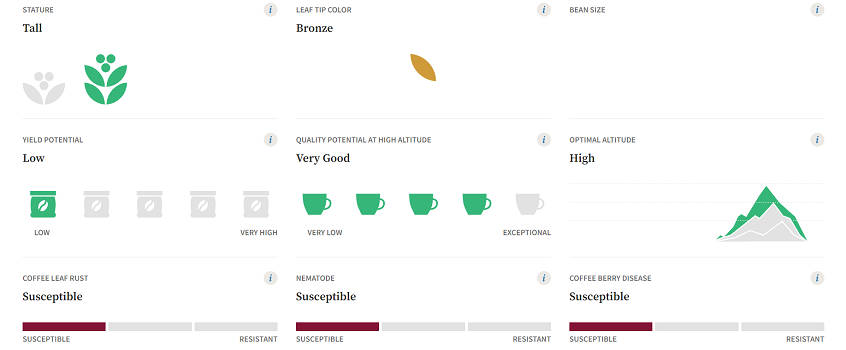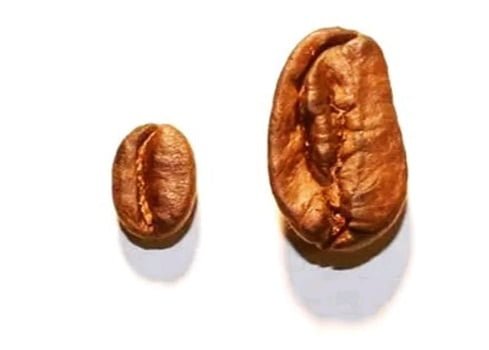If you’re a coffee lover, you’ve probably heard about the mythical Maragogipe (or Maragogype) coffee variety.
Maragogipe coffee variety is a natural mutation of the popular Typica coffee plant from the Coffea Arabica family. It produces gigantic coffee beans that can be more than twice the size of regular beans! For this reason, Maragogipe beans are nicknamed “elephant beans”.
Despite their giant size, Maragogipe beans brew a deliciously complex and aromatic cup of coffee.
However, there is a tradeoff – Maragogipe plants give very low yields. This makes Maragogipe a rarity in the coffee world.

The Origins of Maragogipe Coffee
The Maragogipe coffee variety was first discovered in 1870 near the Brazilian city of Maragogipe as a natural mutation of the Typica coffee plant.
While Maragogipe produces the highly coveted large beans, it is susceptible to major coffee diseases like leaf rust and nematodes.
Its low yields and disease risks have prevented large-scale cultivation. Most farmers choose to grow higher-yielding varieties like Pacamara or Mundo Novo instead.
Still, Maragogipe’s unique bean characteristics have led to limited production in Arabica Coffee growing regions beyond Brazil like Mexico, Guatemala, Colombia, Panama, and Hawaii. But only specialty growers produce small batches of this rare bean.

The Characteristics of Maragogipe Variety
The Maragogipe variety is best known for its remarkably large coffee beans and leaves. This natural mutation causes the beans to grow over twice as large as a regular Arabica bean, earning them the nickname “elephant beans”.

The Maragogipe coffee plant thrives in high-altitude areas and features tall trees with distinctive bronze-colored leaf tips.
The variety is most often processed using the natural method to bring out its inherent complexity and sweetness.
The large size allows more sugars to develop within the bean during processing, highlighting delicious fruity flavors in the cup of coffee.

Sub-Varietals Derived From Maragogipe
The two popular coffee hybrids derived from the Maragogipe variety are Pacamara and Maracaturra.
Both hybrids retain the desirable Maragogipe bean characteristics while overcoming the low yield issue, making them more viable for commercial production.
1- Pacamara
Pacamara is a cross between the Maragogipe and the Pacas variety and is largely grown in El Salvador. It offers exceptional cup quality, even better than the parent Maragogipe- often scoring 90+ in taste competitions.
2- Maracaturra
Maracaturra is a hybrid of Maragogipe and Caturra and is mostly grown in Nicaragua.
What does Maragogipe coffee taste like?
Maragogipe coffee can vary greatly in taste depending on the specific growing region.
But in general, Maragogipe is prized for producing a naturally sweet and low-acidity cup of coffee. Typical tasting notes include flavors of peach, chocolate, honey, and bergamot.
However, some early opinions stated that the bean yields a woody and unpleasant cup of coffee.
But the same variety grown in other terroirs may yield very different results.
Maragogipe from the Ka’u region of Hawaii is highly regarded for its well-balanced and mellow body, medium acidity, and extremely sweet taste, scoring over 90 in professional cupping competitions.
I’ve tried Colombian Maragogipe which was also nicely balanced with a sweet peach-like flavor and chocolate undertones.
And I think Maragogipe has the potential to produce a highly desirable cup of coffee with a distinct sweetness when grown in optimal conditions.
Discover Guides on other Coffee beans
- Geisha Coffee Beans
- Bourbon Coffee Beans
- Catuai Coffee Beans
- Catimor Coffee Beans
- Liberica Coffee Beans
- Excelsa Coffee Beans
Final Thoughts
And there you have it, the full scoop on the rare Maragogipe coffee variety and its giant “elephant beans”! From its serendipitous origins to its exceptionally sweet taste, Maragogipe is truly a unique treasure for coffee aficionados.
Have you ever had the chance to try this rare find? Let me know in the comments! I’d love to hear your impressions of the Maragogipe flavor profile and experience hunting down these beans.
Check out the guide on Different types of coffee beans




I wish Maragogipe coffee was easier to find in stores! After reading this I’m on the hunt for some to try the unique flavor profile for myself.
Maragogipe’s like the unicorn of coffee beans but indeed very rare! Totally worth the hunt though.